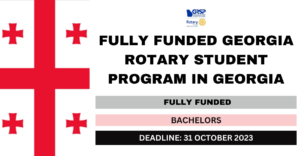The Fully Funded Georgia Rotary Student Program in Georgia is offered for a bachelor’s degree in the field of All subjects offered by the university. Students from around the world apply each year for this amazing cultural experience. Our ambassadorial scholarship is focused on education and cultural enrichment. We want you to come to the United States as an ambassador for your country and leave being an ambassador of the United States and many other countries you will learn about from your fellow GRSP students.
Fully Funded Georgia Rotary Student Program in Georgia 2024

DEADLINE
31 October 2023
STUDY IN
Georgia
PROVIDER
Georgia Rotary Student Program
STUDY LEVEL
Bachelor, Undergraduate
SUBJECTS
Subjects offered by the university
FUNDING TYPE
Fully Funded Scholarships
Scholarship Eligibility
The eligibility criteria for the Fully Funded Georgia Rotary Student Program in Georgia are stated below:
1. Applicants must be either 18 years old by August 1st or younger than 25 by the same date (NO EXCEPTIONS).
2. Married or engaged applicants are ineligible for scholarships (NO EXCEPTIONS).
3. Applicants who have studied in the USA for more than four months are not eligible for a scholarship (NO EXCEPTIONS).
4. Citizens and Dual Citizens of the United States are not eligible for the GRSP scholarship.
5. To be eligible for the scholarship, students must be sponsored by a Rotary Club in their country. If the student does not associate with Rotary, they can use the tool on the right to locate a Rotary Club near them and approach them for sponsorship. Alternatively, if their parents or family friends are Rotarians, they can request their clubs to sponsor them.
READ ALSO: UNILAG MASTERS IN URBAN MANAGEMENT PROGRAM
Scholarship Benefits
The Fully Funded Georgia Rotary Student Program in Georgia pays scholastic costs, including tuition, dormitory, meal plan, and $500 per term toward medical insurance costs. Students are responsible for covering all transportation expenses to and from the United States, the required medical insurance costs, any income taxes imposed on non-scholarship income by the U.S. Treasury, any transcript translation and/or evaluation expenses, textbooks, passports, visas, inoculations, and personal spending money.
I hope you find this article helpful.
Leave a Reply